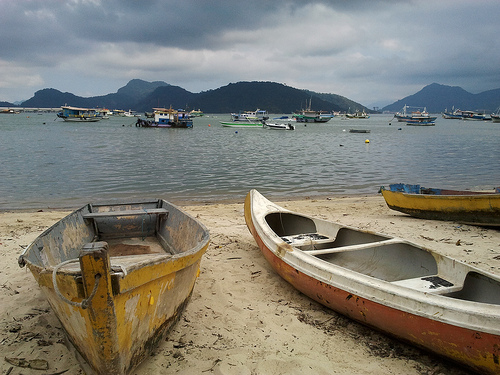Claudia Ciobanu*
RIO DE JANEIRO, Jun 18 (TerraViva) A trip to Sepetiba Bay in western Rio de Janeiro might give a better sense of the relationship between business and local communities than the official programme of the Rio+20 conference.
The many corporate representatives in attendance at the summit are working hard to depict themselves as part of the solution – to climate change, food security, the energy crisis, and others – rather than a source of the problem.
Yet moving westwards from Rio Centro also brings an erosion of the message so often heard here that businesses and local communities can and should happily work together to find sustainable solutions for the world’s crises.
Western Rio is the location of Sepetiba Bay, whose ecosystem and surrounding areas make it one of the richest biodiversity hotspots in the world. In 1986, the beach region close to the bay was given protected status by Brazilian authorities. The area is also renowned for its diverse cultural heritage, including the trade of artisanal fishery kept alive until today by thousands of local families.
At Ilha da Madeira, one entry point into the Sepetiba Bay, the water is filled with small colourful boats, a few out on the water, many left abandoned, a couple up for sale in spite of their advanced state of decay. Looking toward the horizon gives a hint of why some of the boats have been laid to rest: a huge, almost one-kilometre-long pier dominates the view, making it difficult for the small boats to pass through.
The pier is the most recent infrastructure project constructed to handle exports of steel and ore from Brazil to resource-hungry countries in Europe and Asia. In all, the bay now hosts five ports for international trade, the biggest of them serving the ThyssenKrupp Companhia Siderurgica do Atlantico (TKCSA), owned 73 percent by German steel giant ThyssenGrupp with the rest of the stakes held by Brazilian Vale.
In the greater Rio de Janeiro area, TKCSA operates a steel plant which began operations in 2010, as well as adjacent power and chemical plants and port infrastructure.
For the fishermen in Sepetiba Bay, the piers are the problem. And the main target for locals’ complaints is TKCSA: they operate the first and biggest pier constructed there, and the company’s steel plant has been repeatedly blamed for causing severe air pollution in western Rio.
“Before the company came here, we could bring home even 60 pounds of shrimp a day,” says fisherman Sergio de Souza-Rodriguez, as he drives his dilapidated boat out into the bay. “Now it is more like one pound per day.”
He repeatedly motions towards the first piers coming into sight as the boat advances into the open waters: “These used to be the best places for fishing. Now we cannot pass with our boats through the openings in the piers. It’s dangerous.”
“This company came to the bay with huge promises, offering us jobs, and the argument of jobs is always very convincing,” says Isac Alvez, a fishermen leader from Sepetiba Bay. “When they came here, we were more than 8,000 fishermen and now we are less than 1,000. They promised to create 2,500 jobs but instead their coming meant the loss of 7,000 fishing jobs.”
The fishermen also complain about the pollution being released into the bay by the industrial operations: digging underwater to construct the piers has disturbed toxic waste residues lying there following repeated spills from another industrial operation in the region, of Inga Mercantil.
As de Souza Rodriguez’s creaking boat makes its way alongside huge vessels taking steel and ore abroad, the fishermen’s vulnerability in the face of the pressures of international trade seems overpowering.
Asked what they want, some fishermen name better boats once promised by the authorities and financial compensation, seemingly accepting their fate.
But others are ready to fight on: Ivo Siquera Soares, one of the fishermen leaders, laughs, saying, “We will not sit and watch this boat pass” – rebelliously reverting a Portuguese phrase that signals powerlessness (estamos vendo a barca passar).
Siquera Soares calls for a change of system and for the nexus between politicians and big capital to be broken.
*The reporter visited Sepetiba Bay as a part of Rio Toxico, a series of tours around polluted areas in Rio de Janeiro organised by NGOs monitoring the Brazilian Development Bank and corporations active in Brazil.








 Add to Google
Add to Google







